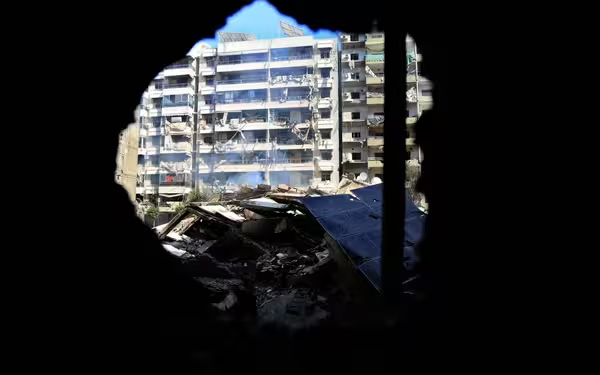Sunday, November 17, 2024 12:34 AM
Israel Airstrikes Transform Beirut's Dahiyeh Into Desolate Ghost Town
- Intense airstrikes leave Beirut's Dahiyeh in ruins.
- Residents evacuate as community faces devastation.
- Hezbollah claims civilian buildings targeted in attacks.
 Image Credits: arabnewspk
Image Credits: arabnewspkIsraeli airstrikes devastate Beirut's Dahiyeh, transforming it into a ghost town as residents flee amid destruction.
In recent days, the southern suburbs of Beirut, a region known for its vibrant life and as a stronghold of the Hezbollah militant group, have transformed into a scene of devastation. The area, usually bustling with activity, has been left eerily quiet following a series of intense Israeli airstrikes. These strikes have not only caused significant destruction but have also led to widespread evacuations, leaving the streets filled with rubble and smoke.
On Wednesday, the aftermath of the bombardment was evident as AFP photographers captured images of thick smoke rising from buildings that had been hit overnight. The once lively streets were nearly deserted, with only a few young men on mopeds navigating the debris-laden roads. Residents, faced with the urgency of evacuation, hurriedly packed their belongings, some even tying mattresses to the roofs of their cars as they fled.
Among those who chose to stay was Mohammed Sheaito, a 31-year-old taxi driver. He described the terrifying experience of the strikes, stating, "During the night, the ground shook below us... and the sky lit up." Sheaito lamented the loss of community, saying, "The area has become a ghost town," as he sent his family members, already displaced by earlier bombings, to safety.
The southern suburbs, known as Dahiyeh, are densely populated with residential buildings, shops, and businesses, and are also home to key Hezbollah institutions. Israel has claimed that its military operations are aimed at targeting sites associated with the Iran-backed militant group, which has a long history dating back to the Lebanese civil war in the 1980s.
In the past week, a series of Israeli raids have intensified, culminating in a significant strike that reportedly killed Hezbollah chief Hassan Nasrallah. Following these events, many residents received evacuation orders via social media, prompting thousands to flee their homes. Some sought refuge with relatives, while others found shelter in schools or rented apartments. Unfortunately, those without options have been forced to sleep on the streets.
Sheaito reminisced about the vibrant life that once filled the area, recalling how people would gather at cafes or play backgammon in the streets. Now, he noted, "Everything is closed — corner stores, restaurants... even the pharmacy." He expressed the dire situation, stating, "I leave Dahiyeh to buy food supplies," highlighting the scarcity of essential goods.
Mohammed Afif, the head of Hezbollah’s information office, asserted that the buildings targeted in Dahiyeh were "civilian buildings and are not home to military activity." This claim comes as emergency workers continue to search through the rubble of a flattened residential complex, desperately looking for survivors. In another area, a woman was seen carrying a cat away from a burning building, a poignant reminder of the human cost of the conflict.
The destruction has rendered many neighborhoods uninhabitable. One resident, who wished to remain anonymous, expressed shock at the devastation, stating, "I came quickly to get our identity papers and some other things." He described the area as lacking basic necessities, with no water, shops, petrol stations, or electricity, as generators have failed in a country already struggling with power supply.
As the situation continues to unfold, the once vibrant community of Dahiyeh now stands as a stark reminder of the toll of conflict. The streets, once filled with life, are now silent, with only a few people remaining. The resident concluded, "I only saw one or two people on the street. There is no life here anymore." This tragic transformation serves as a powerful illustration of the impact of war on civilian life, leaving many to ponder the future of a community that has been irrevocably changed.













